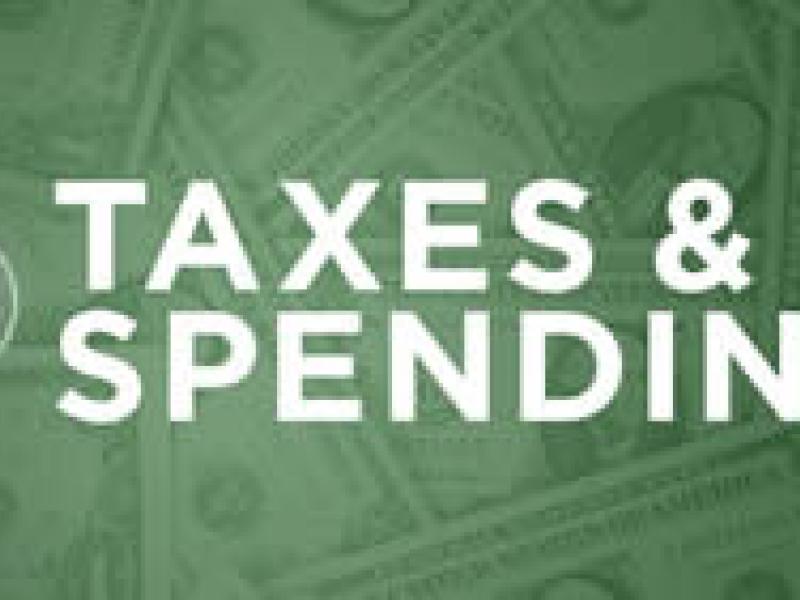Recent news on the federal budget deficit has been unusually positive: the deficit is shrinking. Some economists on the left argue that the deficit was never a serious threat to the health of the economy, while other experts say that increases will soon be on the way again, and long-term solutions need to be found. What does the public think about this debate? From the Roper Center for Public Opinion Archive:
Importance of the federal budget deficit
In 1940, People's Research asked Americans if it was important for the federal government to balance the budget in the next two years. Fifty-seven per cent agreed, while 30% said no. Although occasional questions regarding balanced budget issues were fielded through the 40s, 50s, and 60s, no survey asked about the importance of the budget deficit again until 1973. Since then, in poll after poll, strong majorities of Americans have agreed that balancing the budget is important. 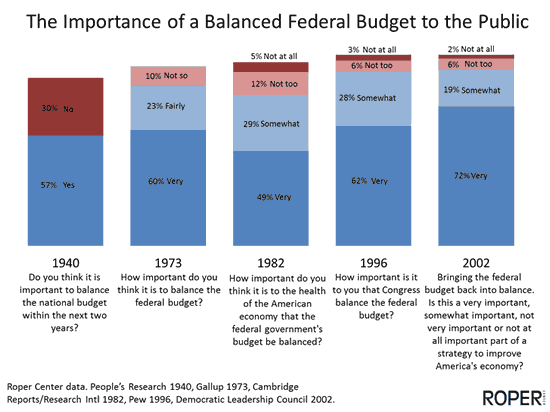
However, a more complex picture appears when the public is asked to choose the most important economic problem from a list of issues. From 1990-1998, NBC/Wall Street Journal asked this question with the same response options, and the deficit consistently remained in the first or second position among the categories, falling behind only unemployment in certain years. When the question was asked again in 2001 after a few years break, energy prices had been added to the list, followed by pension security in 2002, the stock market in 2003, housing prices and the gap between rich and poor in 2006, and the cost of health care in 2008. This slow addition of a range of economic issues reflects changing public discussions about the economy. With the introduction of a wider set of possible problems, the federal budget deficit dropped out of the top slots for several years. Since the recession, however, it has consistently been the second most-chosen top economic problem, behind unemployment.
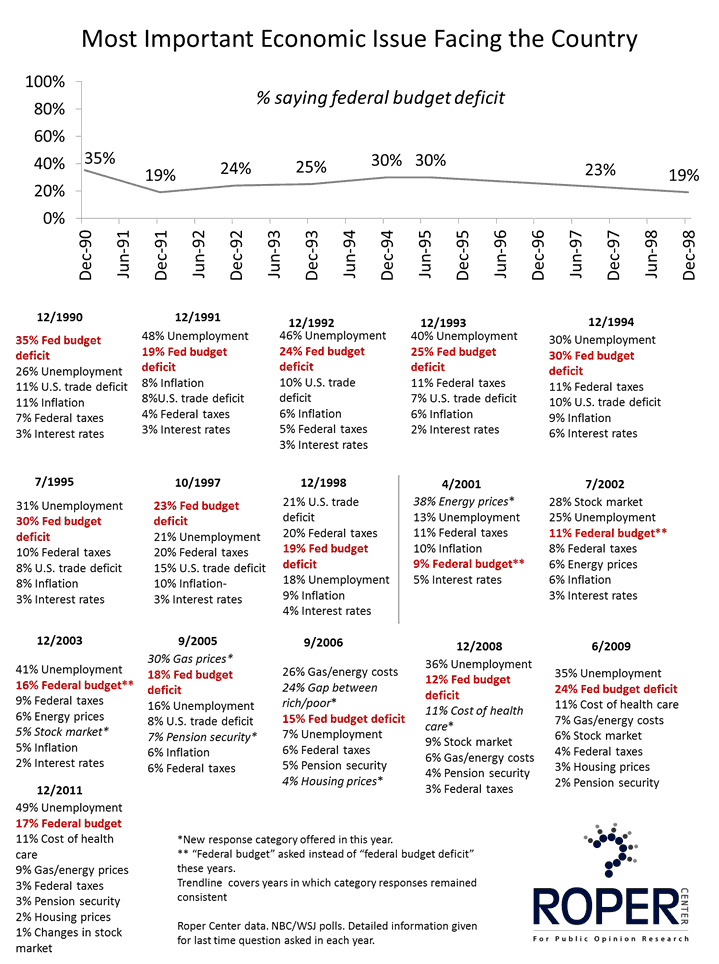
A priority, of course, but more important than a tax cut?
Historically, the public has prioritized balancing the budget over implementing tax cuts, with some exceptions. Starting in 1946 and continuing through the 60s, Gallup asked a series of questions about whether the budget should be balanced before tax cuts put in place. In every case, a greater proportion of the public favored delaying tax cuts until the budget was balanced than wanted an immediate tax cut. However, the public was more split in a 1978 Gallup poll, when 43% said balancing the budget was more important, and 45% said cutting taxes. By a Knight Ridder poll in 1996, the public again preferred a balanced budget to a tax cut, 59% to 34%. In a 2002 CBS News survey, 70% chose a balanced federal budget over a tax cut.
But will it really get balanced?
Americans' concern about the budget has always been shot through with a strong dose of skepticism for the likelihood of actually achieving a balanced budget and reducing the deficit. An NBC News poll in 1979 found only 24% of the public thought politicians would actually work to balance the budget, while 70% didn't believe it. When asked by Gallup/CNN/USA Today in 1993 if the revenues from a tax increase would be used to reduce the deficit, only 33% thought that would happen. Even when the federal budget deficit was eliminated in the late 1990s, the public responded more with doubtfulness than joy. A Tarrance Group/Lake, Snell, Perry and Associates poll in 1998 found that while 15% were happy that the budget had been balanced, 31% just hopeful that it would be balanced, 38% doubtful that it had actually been balanced, and 13% upset because it really hadn't been balanced.
The federal budget deficit and the presidential approval
Perceptions of presidential handling of the federal budget deficit has tracked closely with overall presidential approval, rising and falling in tandem, since the question started being asked in 1983. Handling of the deficit, however, tends to get somewhat lower ratings overall. On the other hand, the relationship between ratings of the president's handling of the federal budget deficit and the size of the actual budget deficit is less clear. Although some connections can be found - Clinton's high approval ratings on the deficit correspond to the shift to a surplus - the approval of handling on the deficit in recent years has largely remained independent from the actual state of the deficit. 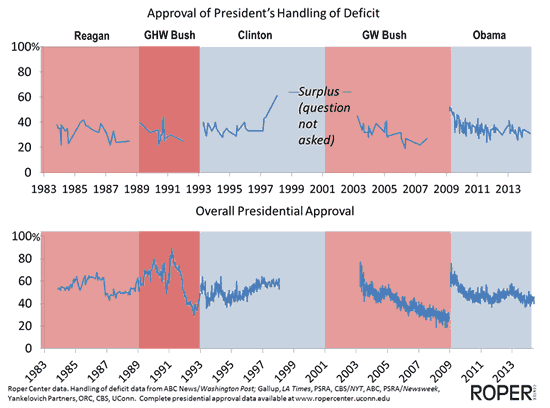
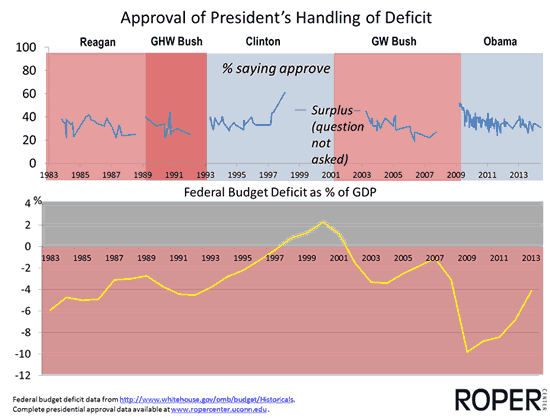
How to fix the federal budget deficit: increasing taxes, reducing spending, or both?
Though the public has often been willing to postpone or forego tax decreases to achieve a balanced budget, generally they prefer spending cuts, or spending cuts coupled with tax increases, to tax increases alone as an approach to balancing the budget. This pattern has held true from the early days of public opinion research. A 1940 Roper/Fortune survey asked those who said the budget should be balanced (76%) if this should be done by reducing expenditures or increasing taxes. When given two options with no specific examples, Americans much preferred the option of spending cuts to tax increases, 71% to 4%, with 15% volunteering that both approaches should be used. A 1984 Time/Yankelovich, Skelly & White Poll found 59% wanted a plan to reduce the deficit to include spending cuts only, 4% tax increases only, and 31% both. The most recent such question from CBS News/NYT in February 2014 shows attitudes have changed: 4% preferred only tax increases, 29% only spending cuts, and 65% both. However, questions about cutting spending on government programs in the abstract tend to overstate the public's willingness to see particular programs cut. A Marist/McClatchy poll of registered voters in 2013 found that public willingness to cut spending rather than increase taxes to close the federal budget deficit varied widely by spending area. 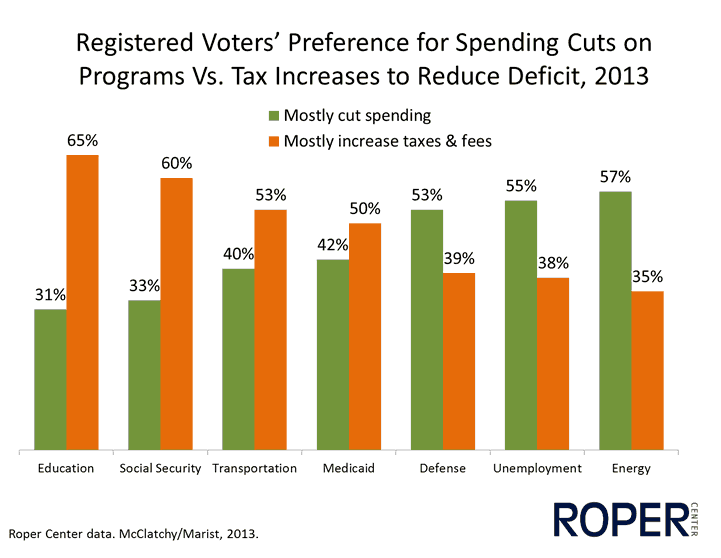
Roper Center data. Collections cited include People's Research 1940; Gallup 1973, 1978; Cambridge Reports/Research International, 1982; Pew 1982; Pew 1996; DLC 2002; NBC/Wall Street Journal 1990-2011; Knight Ridder 1996; CBS News 2002; NBC News 1979; Gallup/CNN/USA Today 1993; Tarrance Group/Lake, Snell, Perry and Associates 1998; Roper/Fortune 1940; Time/Yankelovich Skelly & White 12984; CBS News/NYT 2014; Marist/McClatchy 2013. Handling of deficit data from ABC News/Washington Post; Gallup, LA Times, PSRA, CBS/NYT, ABC, PSRA/Newsweek, Yankelovich Partners, ORC, CBS, UConn. Complete presidential approval data available at ropercenter.cornell.edu Federal budget deficit data from . View more polling questions on the federal budget deficit..
